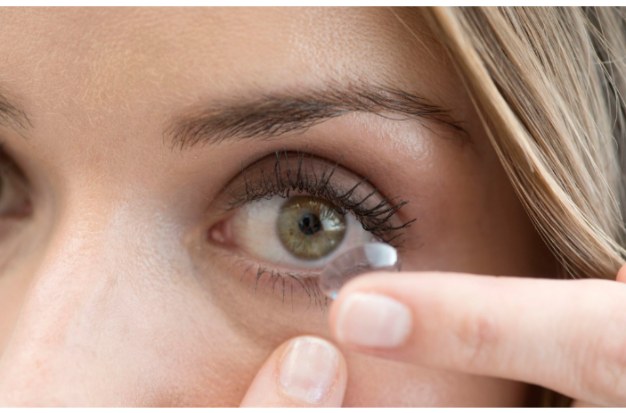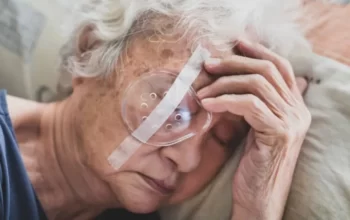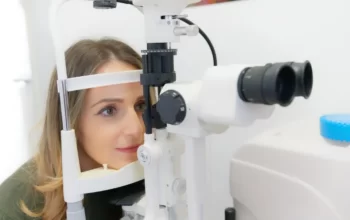
The idea that contact lenses and dry eyes go together like oil and water is untrue. Although having dry eyes means the tear film meant to moisturize your eyeballs isn’t functioning as well as it should, it doesn’t mean you can’t wear contacts. However, Alisha Fleming, O.D., it can make everything a little bit more difficult., an optometrist at Tells SELF Penn Medicine. “Improper contact lens wear and care can cause dry eye issues and can also exacerbate dry eye issues,” Follow these guidelines to ensure a positive experience if you have dry eyes and wear contacts (or want to), advises Dr. Fleming.
A Brief Overview Of Dry Eyes
Before we discuss the various methods you can employ to manage your symptoms, we must first quickly review dry eye and how it arises.
Your tear film greatly affects how comfortable your eyes are, so you’ll probably experience dry eyes if your tear film is deficient in certain nutrients or produces insufficient tears.
Poor tear quality and insufficient tear volume are the two main categories of dry eye.
Do Your Contact Lenses Make Your Eyes Dry?
Patients frequently express frustration with their contact lenses drying out their eyes, which is one of the more common complaints that eye doctors hear. Despite the fact that dry eye syndrome (DES) affects both contact lens wearers and non-users equally, wearing contact lenses can make the symptoms more severe and uncomfortable. Red, itchy eyes are frequently one of the DES symptoms.
Your contact lenses may cause dry eye symptoms if:
- For your eyes, they are the wrong size.
- They’re worn far too frequently.
- Your tears might evaporate because of the materials used to make them.
- Your contacts are being cleaned and stored in the incorrect lens solution.
Tips To Avoid Dry Eye When Wearing Contact Lenses
To prevent eye dryness or inflammation, we recommend the following tips:
- Make sure you’ve had your contact lenses fitted by an eye doctor, as they can determine the precise strength and curvature of the lenses you need and suggest the best lenses for your eyes.
- You should routinely have your eyes checked for vision acuity and overall ocular health. To schedule a thorough eye exam, call Laguna Eyes Dry Eye Center right away.
- Make sure you buy high-quality lenses with good oxygen permeability. People who are prone to developing dry eyes should use hyaluronan-containing lenses, especially silicone hydrogel lenses. Additionally, hard lenses are highly advised as they draw very little moisture from the tear film.
- Never wear contact lenses for an extended period of time until you find a better solution. If you have dry eyes, it’s best to only wear contacts on special occasions, like outings or sporting events, and for a short period of time. As these activities strain your eyes, avoid wearing contacts while using a computer or watching TV.
If your eye doctor advises it, dispose of lenses daily, every two weeks, or once a month. To avoid a bacterial buildup, you should also replace the contact lens containers every few weeks. - When suffering from a cold or the flu, refrain from wearing contact lenses because there is a higher risk of transferring germs to the eyes. Remove your contact lenses if you have conjunctivitis (or pink eye), as bacteria can thrive very well underneath them.
What Kind Of Contacts Are Ideal For Dry Eye Syndrome?
In general, soft contact lenses have a higher likelihood of preventing eye drying. This is because soft lenses allow for more water retention than “hard” lenses, and some soft lenses are even more effective in this regard than others. You should pay attention to the water content of your contact lenses. Your eyes won’t dry out because lenses with a higher water content are typically better at drawing in and holding moisture. The use of cutting-edge technology by brands like Acuvue, Air Optix, Bausch and Lomb, DAILIES, and Freshlook helps to keep contact lenses comfortable and moist.
Recently, producers have released contacts made of specialized materials that are much more effective at preventing dry eye syndrome. For instance, silicone hydrogel contact lenses help keep the eyes moist by enabling particularly high levels of oxygen to reach them. Discuss these specialized lenses with your eye doctor if you frequently experience dry eyes while wearing contacts.
Options For Dry Eyes
Before beginning treatment, your doctor can assist in determining the reason why you have dry eyes.
If your eyes aren’t producing enough tears, your doctor may advise lubricating eye drops. You might need to change medications if one of the ones you’re taking is to blame. In order to keep more moisture in your eyes, there is also a procedure to block the drain system in your eyes. In serious cases, this treatment option might be provided.
You might need to try a different kind of lens if your current pair is the issue. Here are some possibilities.

Lens Materials
There are various materials for contact lenses. A flexible plastic is used in the construction of soft contact lenses, which allows oxygen to reach the eye. Although rigid gas-permeable contact lenses are made of a harder substance, they still permit oxygen to enter the eye.
Hydrogel—a material that contains water—is used to make soft lenses. There are soft lenses that can be worn for a day and then discarded. Up to 30 days can pass between uses of extended wear soft lenses.
Protein deposits, which can irritate your eyes even more, can be avoided by changing your contact lenses every day. Try disposable lenses if you have dry eye issues.
You might also think about switching to a silicone-based hydrogel lens. Unlike other lens types, these ones prevent water from evaporating as quickly. They might be more effective than regular hydrogel contacts at reducing dry eye.
The only disposable lens brand with FDA approval to assist in easing dry eye discomfort is Proclear. Phosphorylcholine, which is present in it, is supposed to draw in moisture and keep your eyes feeling comfortable.
Lens Water Content
Depending on how much water they contain, soft contact lenses fall into one of several categories.
Lenses with a high water content are more likely to lead to dry eye than lenses with a low water content. When first applied, they often send more moisture to the eye, but they can also dry out more quickly. Before you find a lens that works for you, you might need to experiment with ones with various water contents.
Lens Size
Most contact lenses have a 9 millimeter diameter. All that they protect is the eye’s iris, which is colored.
Contact lenses for sclera typically range in size from 15 to 22 millimeters. The sclera, the white portion of the eye, is partially covered by them. Because scleral lenses are gas-permeable, oxygen can reach the surface of the eye. When using this kind of lens, some people say their symptoms improve.
What Additional Steps Can Be Taken To Avoid Dry Eyes While Using Contacts?
Eye drops, sometimes marketed as “artificial tears,” are always a great place to start, and in many cases these products are all a patient needs to prevent irritation and discomfort. In light of the foregoing, it is crucial to confirm that your eye drops are compatible with your contact lenses. If you have any questions about compatibility, consult your eye doctor to avoid any future issues. Some products are only meant to be used with particular types of contact lens materials. The dryness of the eyes can also be reduced with the use of specific cleaning agents and disinfectants. These goods are advertised as moisturizers and do in fact contain them. Always check that the products you use are compatible with the particular type of lenses you wear, just like you would with eye drops.
Patients in the past have had trouble using contact lenses because their eyes were excessively dry. Dry eye syndrome is not as much of a barrier as it once was. It’s almost always possible to come up with a solution with your eye doctor that will let you keep wearing the contact lenses you’ve grown to love.
Conclusion
Sometimes the solution you’re using to clean your contact lenses instead of the lenses themselves is the issue. The preservatives in some solutions can sting and dry out your eyes. Others have components that might not work with specific kinds of soft contact lenses and might result in an adverse reaction.
Consult your ophthalmologist. If they believe that your lens solution may be to blame, try various brands until you find one that works for you.



